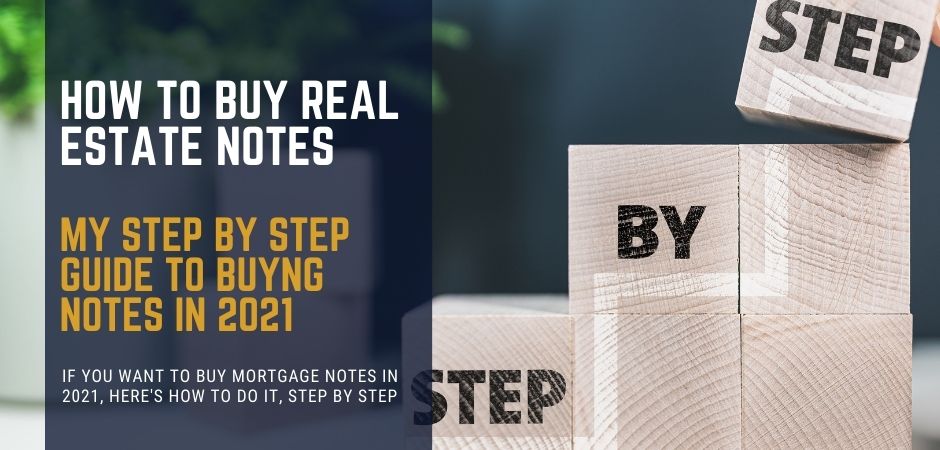How to Buy Mortgage Notes in 2021

David Garner
Buying Mortgage Notes in 2021
If you are thinking of adding more passive income to your investment portfolio or retirement account in 2021, then you should consider mortgage notes. But how do you actually buy mortgage notes? In this article I’ll show you step by step how to buy real estate notes in 2021.
Contents:
- Why Mortgage Notes in 2021
- Different Types of Notes to Buy in 2021
- Buying Mortgage Notes – A Step by Step Guide
Notes for Sale: Join 5,000+ Self-Directed Investors in the Private Lending Portal and see Exclusive Off-Market Notes for Sale Every Week
Why Mortgage Notes in 2021
2020 has been one hell of a year! The global pandemic and resultant State-ordered measures to ‘stop the spread’ have devastated businesses and markets all around the World. Now, as we now creak and groan into 2021, investors are diversifying, seeking security, growth and income outside beleaguered financial markets.
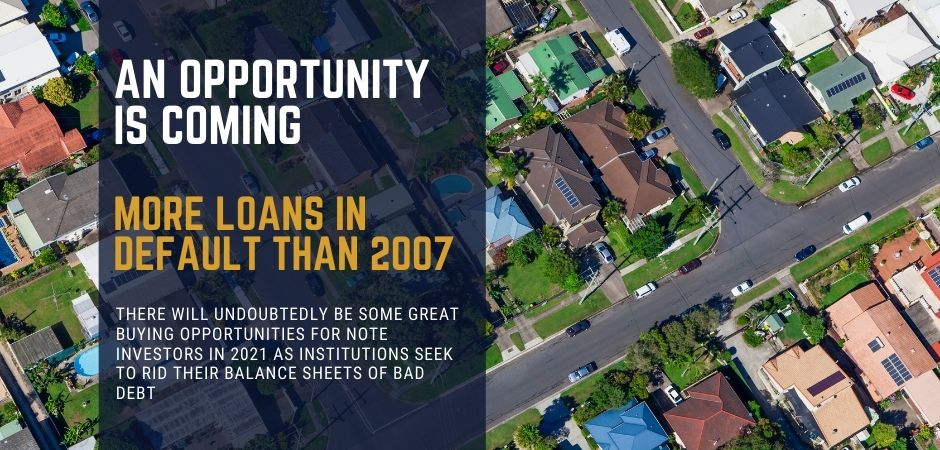
The go-to asset class for investor seeking diversification has always been real estate. But direct ownership of physical property can be time consuming and expensive. That’s why mortgage notes are high on the agenda for savvy investors in 2021. You get all the income and security of real estate with none of the hassles of ownership.
With central banks still printing money like its going out of fashion (and showing no signs of stopping), one thing you can bet on in 2021 is more inflation. So holding a charge over appreciating assets like real estate seems like a very wise choice.
Related: Everything you Need to Know About Investing in Real Estate Notes
Different Types of Notes to Buy in 2021
The best type of mortgage notes to buy in 2021 will largely be defined by your own investing goals. Are you looking for passive income? or to capitalize on discounted assets for a capital gain? Whatever your goals, there are effectively two types of real estate note you can buy; performing, and non performing.
Non Performing Notes
If you are prepared to get your hands dirty and really commit to learning all the ins and outs of investing in real estate notes, you should probably aim to buy non performing notes. These are effectively bad debts on which the borrower is more than 90 days overdue on payments. Lenders and other note owners sell their non performing notes to exit their investment for quick cash and avoid lengthy and costly foreclosure proceedings.
There are lots of strategies for investing in non performing notes. Many investors will attempt to rehab the note by modifying the terms with the existing borrower to get the note re-performing. They will then either sell the note for a profit, or keep it for the income.
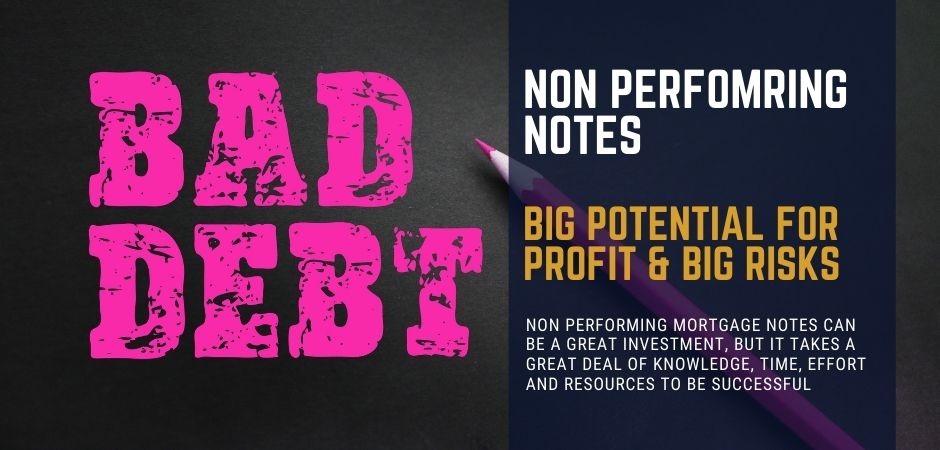
If a non performing note cannot be rehabbed, the investor might foreclose the loan and work out an exit strategy through the real estate. Some investors simply flip non performing notes to other investors when they buy large volumes of notes from banks.
There is likely to be some great opportunities to buy non performing notes in 2021 due to the economic impact of Covid-19 in 2020. While many pundits are predicting a wave of foreclosures, this doesn’t make any sense. Foreclosures take a long time to process (years in some cases), so banks will much more likely sell off their bad debt to investors way before the point of foreclosure.
Performing Notes
If you want to buy mortgage notes purely for the income, and you’d rather not try to absorb an entire industry’s worth of knowledge and education, then buying performing notes is going to be your thing.
There are going to be some amazing opportunities in the real estate market in 2021. A chronic lack of affordable housing combined with an overflow of heavily discounted assets makes for a great investment opportunity. This means there will be lots of opportunity to find performing notes for sale.

Private Lending
There will be lots of real estate investors buying up discounted assets and create good quality homes. This is good news for note investors who can originate their own loans to real estate investors. Being a private lender allows you get to know your borrower more intimately before you invest. A good relationship is absolute gold dust if the project doesn’t go to plan!
Seller Financing
If you don’t fancy finding and vetting a borrower to make private money loans, there will also be ample opportunity to buy seller financed notes from real estate investors in 2021. Much as investors will need private capital to acquire homes, many will also use seller financing as their exit strategy, making for another good source of performing notes to buy in 2021.
Reperforming Notes
Another source from which to buy performing notes in 2021 will be other note investors that bought non performing notes and successfully rehabbed them. Once an investor has a note re-performing, some will want to sell the note to realise their profits and reinvest. So, there will be ample opportunity to buy these types of real estate notes in 2021.
Related: Performing vs Non performing Notes – Which is the Better Investment?
Buying Mortgage Notes – A Step by Step Guide
So, now you’ve decided that notes are a good investment, what next?
There are no hard and fast rules when it comes to buying mortgage notes. Unlike actual real estate where there are lots procedures in place to protect buyers and sellers, buying a note is a far less regulated process. The terms of any note purchase will be determined largely by the buyer and seller.
Here is my step by step guide on how to buy real estate notes in 2021.
Contents:
- Step 1 – Finding Real Estate Notes to Buy
- Step 2 – Due Diligence and Valuation
- Step 3 – Making an Offer to Buy a Real Estate Note
- Step 4 – Closing on a Note Purchase
- Step 5 – Executing Your Note Investing Strategy
This simple guide is not intended to make you an expert, of course there’s always more to learn and every note purchase is different in one way or another. But you can use these 5 simple steps as a framework to guide you through the note buying process.
Step 1: Finding Real Estate Notes to Buy
First things first, you need to actually find a note (or notes) to buy. I’ve already covered some of the main sources for buying real estate notes in 2021. But here is a slightly longer and more specific list:
- Real Estate Investors – You will find real estate investors in need of private money loans, and others that sell their properties using seller financing and sell the note.
- Private Note Investors – These are the guys already actively buying notes. You will find note investors selling their re-performing notes, and also selling non performing notes that they have either bought cheap and want to flip, or are unable to rehab and want to dispose of.
- Banks – It is possible to buy notes direct from banks – particularly non performing notes. But these institutional lenders usually sell in bulk, so be prepared to put your hand deep in your pocket. You can use an online tool such as BankProspector to find banks that are selling notes.
- Hedge Funds – These are investors that buy real estate notes from banks in bulk and then resell them to smaller investors. There is never any shortage of these types of notes for sale.
- Servicers – Loan servicing companies will often handle defaults and foreclosures for lenders, so they can be a good source of non performing notes. As there are lots of loans in default right now due to Covid, servicers will be a good place to buy notes from.
- Online Note Exchanges – There are quite a few online exchanges that allows buyers and seller to trade real estate notes. They are a great way to connect with both real estate investors and private note investors.
As I have already mentioned, 2021 will bring with it some excellent opportunities to buy non performing notes and heavily discounted real estate. As the Covid moratorium on foreclosures and evictions is lifted, many homeowners and landlords will; be forced into foreclosure.
Related: 20 Verified Sources of Mortgage Notes for Sale in 2021
Step 2: Due Diligence and Valuation
Once you find a mortgage note to buy you will then need to figure out whether that note is an appropriate investment for you based on your strategy. Your investing goals and objectives drive your note investing strategy, and this in turn will guide your due diligence process.
The LASER Note Evaluation System
The best system for evaluating real estate notes is the Loan Acquisition Suitability and Evaluation Rating system (LASER), created by renowned note investor, Pat Blount. LASER is a ratings system of about 30 questions based on 3 key areas;
- The Loan (Unpaid Principal Balance, Loan Status etc.)
- The Collateral (Condition, Occupancy, Taxes etc.)
- The Lender (Price Expectation etc.)
The answer to each question is given a rating based on your preferred strategy, and so the whole system is designed to help you figure out how likely is it that buying the note will help you achieve your investment objectives.
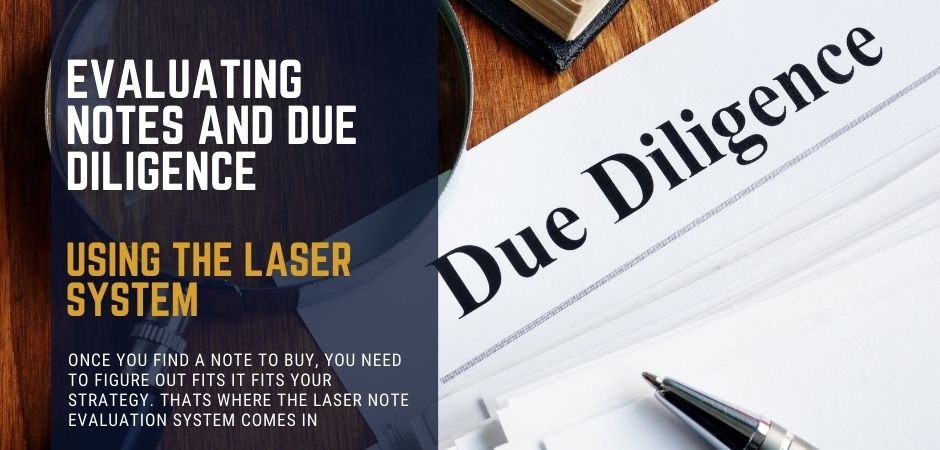
In any case, you’ll want to see a title report for the property. This will give you much of the required information relating to the collateral.
You’ll also want to have a suitably qualified and experienced attorney to hand for any legal issues that come up. If you are buying your note from a bank, they will definitely have an attorney on hand – or at least attorney-approved paperwork.
Remember, above all else the note business is a relationship business. Whether you’re buying non performing notes from a bank, or a seller financed note from a real estate investor, the success or failure of your attempted purchase will depend on your relationship with the seller (or borrower if you are originating your own note).
Related: How to Appraise a Property Value for a Private Lending Deal
How to Value a Real Estate Note
Once you have evaluated a note and decided it is an appropriate purchase for your own investing strategy, you have then have to figure out exactly how much money you’re prepared to offer the seller.
Here are some of the main variables that add or subtract value from a real estate note
This includes:
- Deposit
- Seasoning
- Borrower credit score
- How many payments remaining
- Interest rate
- Interest calculations (daily, monthly, annually etc.)
- Is it an institutional note or a private note
- Monthly payments
- Any balloon payments
- Future value
- Debt to income ratio
- Maturity date
- Is it performing or non performing
- Collateral value
- Local real estate market performance
At the end of the day, if a note fits your strategy it is down to you to decide how much you are prepared to pay for it. And it is up to the seller as to whether they’ll let it go for that price. Your attitude and tolerance to risk are subjective, and some investors are prepared to pay more than others for the same risk/return.
Related: Understanding and Assessing Credit Risk
Step 3: Making an Offer to Buy Real Estate Notes
There are effectively three stages to making an offer to buy a mortgage note.
- Making an Offer
- Consolidating Your Offer
- Due Diligence
Making Your Offer
Starting with the offer, there are a few different ways this could happen depending on the seller. This could be open bids, sealed bids. This is often used by banks selling notes and the process will have hard and fast rules about timelines, deposits and other factors.
Instead of open or closed bids, in some cases you may have to submit a letter of intent or an indicative bid. The LOI lays out your terms and conditions for buying a note.
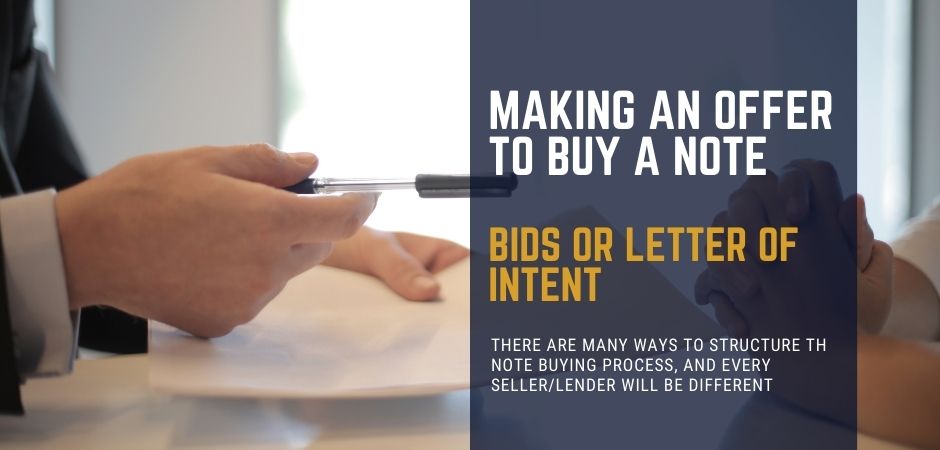
There are cases where you will have to make an indicative bid. This is where you make an offer prior to receiving all the paperwork. An indicative bid is contingent on your due diligence staking up once you get all the details.
There are many ways to skin a cat, and ultimately how you make your offer to buy any real estate note will be dictated by the processes of the seller. Banks will be different to private investors, and even most banks’ bidding processes vary from one to another.
This again highlights the importance of relationship. Make sure you know your seller and understand what they need from you!
Paying Your Binder
Whether you call it a binder, earnest money or deposit, this is effectively the money you put upfront when you make your offer to buy a real estate note. You can lose your binder if you renege on the terms of the note purchase agreement. Typically the binder is about 10% of the intended purchase price of the note(s). Sometimes you’ll need to send a binder with your offer, other times you won’t need one at all. Again, it just depends on the seller.
Doing Your Due Diligence
We already covered this in an earlier section of this article. Once you have made your offer and deposited your binder with the sellers attorney, you will have between 5 an 30 days with access to all of the paperwork to do your due diligence. The note game moves quickly, and if you cannot act fast then you will lose out!
If you got this far and your DD checks out, then you’re almost there., but one final thing… If you can, always use escrow to wire your funds when buying notes. Do NOT send your funds direct to the seller. Escrow will usually be held with the seller’s attorney.
Step 4: Closing on Your Note Purchase
This is it! Your offer has been accepted, your due diligence done, escrow is open and now its time to close on your note purchase.
Your job here is to send your funds by wire on time. Do not miss the closing deadline or the seller will never deal with you again.
Here are the three things you’ll need to close when buying mortgage notes:
- The mortgage or deed of trust.
- The signed promissory note.
- The assignment of the note to you as the new lender.
Congratulations! You’re now the proud owner of a real estate note. And if you did your due diligence right then this will be a great note for your overall note investing strategy.
Step 5: Executing Your Strategy
Now you own the note, the rest is up to you. You may be looking to foreclose the loan and own the real estate, or you might want to rehab the note and then keep it for the reperforming income, or sell it on to another investor.
If you are keeping the note you will need a loan servicer to collect payments and handle record keeping and paperwork. If you are going the foreclosure route you will need an attorney. Either way, you are now well on the way to realising your first note investment profits!
I hope you found this article useful. You can join our community of over 5,000 self-directed investors and see new note investing and private lending opportunities every week in our Private Lending Portal.
-
Some More Note Investing Articles:
- Where to Buy Mortgage Notes – A Complete List of Verified Sources
- Note Investing 101 – Everything you Need to Know About Note Investing
- What is a Note and What Terms Should it Contain?
- Performing vs Non Performing Notes – Which is the Better Investment?
- The Private Lender’s Guide to Assessing Credit Risk
- Understanding Lien Position and Priority
- How to Buy Mortgage Notes Online in 2021
- How to Assess Real Estate for note Investing and Private Lending
- Find Performing Notes for Sale in 2021
- Private Lending 101 – Everything you Need to Know About Private Money Lending
- Is Buying Mortgage Notes a Good Investment in 2021?
- Performing Notes – Everything you Need to Know
- Is Investing in Real Estate Notes Risky?
If you would like to receive details on the latest investment deals, click here to receive our Priority Investor weekly email, with details of exclusive investor-ready note and lending deals direct to your inbox once per week.


